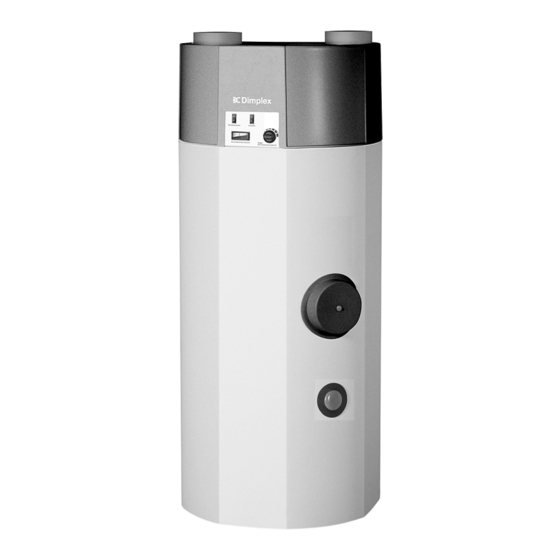Dimplex KWP 300 Manuel d'installation et d'utilisation - Page 6
Parcourez en ligne ou téléchargez le pdf Manuel d'installation et d'utilisation pour {nom_de_la_catégorie} Dimplex KWP 300. Dimplex KWP 300 17 pages. Dimplex kwp 300 heat pump for cooling of domestic water

3.
Storage and Transport
3.1
General Requirements
As a rule, the CWP is to be stored or transported in its shipping box in upright position and without water charge .
For a transport over short distances, and provided due care is exercised, an inclination angle of up to 45° is
permitted. Both during transport and storage, ambient temperatures of -20 to +60 °C are permissible.
3.1.1 Transport using a forklift (or lift truck)
When transported by a fork lift, the HPCDW must remain mounted on the pallet. The lifting rate should be kept to a
minimum. Due to its top-heaviness, the HPCDW must be secured against tipping over. To prevent any damage, be
sure to place the HPCDW on a level floor.
3.1.2 Manual transport
For the manual transport, the wooden pallet can be used for the bottom part. Using ropes or carrying straps (which
can be placed around the jacket of the storage tank and secured to the water tube nipples), a second or third
handling configuration is possible. With this type of handling (applies to the transport by hand truck as well), care
must be taken that the max. permissible inclination angle of 45° is not exceeded (see Figure). If transport in an
inclined position cannot be avoided, the HPCDW ("heat pump" switch) should be taken into operation one hour
after it has been moved into final position at the earliest.
Caution! Do not lift the unit by its cover
(the cover is not designed to withstand the weight of the unit !)
4.
Installation
4.1
Installation Site
CAUTION!
¾# The HPCDW must be sited in a dry and freeze-proof room , the room air temperature and/or the air taken in
by the HPCDW must be within a temperature range of 20°C to 45 °C (required for heat pump operation).
¾# In addition, the unit must not be installed in rooms where there is an explosion hazard due to gases, vapours
or dust.
¾# The air drawn in must be not excessively contaminated or heavily laden with dust.
¾# The floor surface must have adequate load bearing capability (the estimated HPCDW weight is 400 kg when
fully loaded!).
For trouble-free operation as well as for the performance of maintenance and repair work, provide clearance of at
least 0.6 m all around the unit, furthermore, a minimum ceiling height of approx. 2.50 m is required for operation
without airducts or airduct elbows ( "free-blowing" installation") (see Fig. 4). The connection to the HPCDW is
effected (optionally) by means of airducts (NW 160) which must not exceed a total length of 10 m.
Fig. 3: Transport of the unit
6
45°
